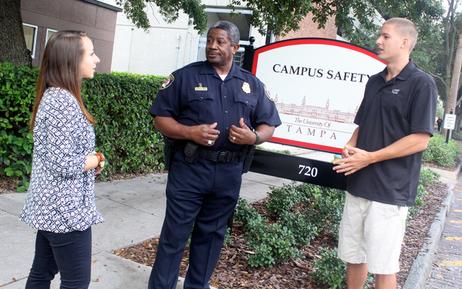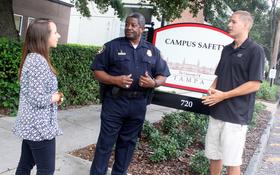Campus Safety on Community Colleges
To increase campus security and student safety, community colleges across the country are boosting their security efforts. With new technologies for added support, in addition to widespread tools for campus officials and student communication, community colleges are striving to provide all campus visitors with a safe and supportive environment.
Community College Campus Safety Efforts
While each community college campus has its own unique safety and security protocols, most schools provide students with fundamental officers, resources, and security measures.
Located near Detroit, Michigan, Henry Ford Community College provides students with a specific office designated for campus safety. As the school describes,
“Campus Safety is responsible for maintaining and releasing incident and accident reports, key control, issuance of employee and student ID cards, maintenance of the access control system, crime statistics, crime prevention and security awareness programs such as Campus Watch and Safe Walk, as well as overall control of all security and safety operations.”
While Henry Ford certainly provides students with basic theft and safety efforts, their added security awareness programs help foster increased and widespread support.
For example, Henry Ford Community College’s Safe Walk program was designed by both the Student Government and the Office of Campus Safety. It is described as an
“An integral part of a safe campus is the involvement of students in their campus community. Safe Walk student volunteers provide an escort to any student or staff member who requests it. Safe Walk volunteers are trained and dispatched by the Office of Campus Safety and serve as additional eyes and ears on campus.”
Safe Walk is especially beneficial for students who have nighttime classes or who are forced to walk on the campus alone after dark. To ensure everyone’s safety,
“Safe Walk volunteers can provide an escort from your class or office to your vehicle or anywhere else on campus.” Students can simply pick up one of the campus’s emergency phones or can call the campus security office to meet with an escort. And students in need of an escort can be confident of their designated guide’s background, as “Safe Walk students are trained and supervised by the Office of Campus Safety. Students must pass a background check before being allowed into the program.”
This video offers an overview of Henry Ford Community College in Dearborn, Michigan.
Located in Fort Lauderdale, Florida, Broward Community College is another academic institution focused on providing students with outstanding safety services. In addition to encouraging all faculty, staff, and campus-centered individuals “to report criminal acts and safety hazards or occurrences to their Campus Security Department,” BCC also provides students and faculty with added tools for safety. As BCC explains,
“the college utilizes several ways to inform the college community about campus safety and security. These services are offered through the Campus Security Offices, Student Affair Offices, and college-wide training programs. This information is disseminated through student/employee orientation, campus publications, and flyers, or any other media deemed appropriate such as the World-Wide Web.”
To keep students updated and informed, the campus security efforts utilize the tools of technology to help ensure the safety of all BCC students, faculty, and community members.
This video offers an overview of Broward College in Fort Lauderdale, Florida.
Community College Campus Safety Tips
As Washtenaw Community College Campus Security experts explain, every community college student can take advantage of simple steps to improve one’s safety. First, students should bring a lock to school if they use school/campus-designated lockers. In addition, students should put their names on all their possessions, including books. As the officials reveal, “many ‘found’ items are discarded each semester because no one claims them.”
Also, to avoid any items from being lost or stolen, students should never carry more money or items than necessary. They should never leave items unattended in a class, library, or other campus setting. Some students have even been known to leave expensive laptops unattended as students take a study break or a bathroom break. This casual error can cost a student thousands of dollars if the computer is stolen or damaged.
To maintain one’s safety, students should avoid walking alone after dark. If one is forced to walk alone, students should plan to park their car beneath parking lights before class. Also, students should try to park close to their classroom door’s exit so that one is not forced to walk very far alone. Adding to this, students at WCC, in addition to other community colleges across the country, can take advantage of the campus security resource officers/volunteers, who can walk students to and/or from one location to another after dark to increase each student’s safety.
Regarding electronic and technological safety, Washtenaw Community College recommends that all students keep their passwords, school-issued and otherwise, completely private. Some students often share passwords with friends; this can be a dangerous and costly choice. Additionally, students should check their accounts and personal data regularly from a secured internet connection on online sites; this allows students to ensure that their information is safe and protected.
This video offers an overview of Washtenaw Community College in Ann Arbor, Michigan.
By planning and keeping safety precautions in mind, you can be safe on your community college campus, day or night.
Questions? Contact us on Facebook and Instagram. @communitycollegereview
#CampusSafety #CommunityColleges #StudentSecurity #SafeWalk #TechForSafety #communitycollege















